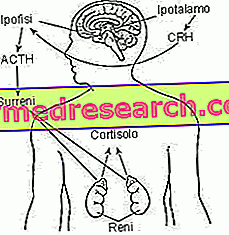Generality
Adrenal insufficiency is a condition in which the endocrine activity of the adrenal glands appears to be severely impaired, to the point of being insufficient with respect to the body's needs.

The adrenal glands are two small glands located in the adipose tissue that covers the upper portion of the kidneys; they are essential for the synthesis of three hormonal classes, that of androgens (less important because accompanied by gonadic synthesis), that of glucocorticoids (led by cortisol) and that of mineralocorticoids (captained by aldosterone).
Symptoms
To learn more: Symptoms of Adrenal insufficiency
It is precisely the lack of one or more of these hormonal classes that determines the characteristic symptoms of adrenal insufficiency; this condition typically occurs with hypoglycemia, dehydration, hypotension, vertigo (especially when you suddenly get up from a sitting or lying position) weight loss, confusion, weakness, nausea, diarrhea, browning of the skin and excessive need for salty foods.
The same symptoms are also typical of Addison's disease, which not by chance represents the most common cause of primitive adrenal insufficiency.
Due to the lack of androgens, a reduction in pubic and axillary hair and a decrease in libido (sexual desire) can also be appreciated in women
Often, adrenal insufficiency is established gradually, with nuanced and slowly aggravating symptoms that make early recognition of the disease very difficult.
On the other hand, the clinical manifestations of adrenal insufficiency are accentuated in conditions of severe stress, such as an accident or a serious infection, to the point of being lethal in the absence of adequate treatment; in these cases we speak of "Addisonian crisis" or acute adrenal crisis.
Causes
Primary Adrenal Insufficiency
The primitive forms of adrenal insufficiency are due to an intrinsic damage of the adrenal gland, which in spite of an increased level of ACTH fails to produce adequate levels of cortisol; one speaks in these cases of Addison's disease. Most episodes (75-80%) are sustained by extensive damage to the adrenal parenchyma on an autoimmune basis (abnormal antibodies directed against organ cells); in these cases hyposurenalism is very often accompanied by other diseases with autoimmune pathogenesis; frequent is the association with chronic thyroiditis (Hashimoto's disease), type I diabetes mellitus, premature ovarian failure or with skin problems (alopecia and vitiligo). The infectious and in particular the tuberculosis etiology are of minor importance today compared to the past, with a higher incidence in developing countries. Other causes of primitive adrenal insufficiency include adrenal tumors, metastases and adrenal haemorrhages, amyloidosis, hemochromatosis, adrenal developmental abnormalities and various types of infections.
Secondary Surrenal Insufficiency
The secondary forms of adrenal insufficiency are due to a pituitary problem, located at the level of the small gland at the base of the brain and responsible, among other things, for controlling adrenal activity through the release of the adrenocorticotropic hormone (ACTH). This hormone acts as a powerful stimulus to adrenal activity, which in its absence is deficient, to the point of causing hypotrophy of the organ. The secondary forms of adrenal insufficiency are far more common than in cases of Addison's disease; often they are temporary, due to the abrupt withdrawal of prolonged therapy with cortisone or to the surgical removal of secreting ACTH tumors.
More rarely, secondary adrenal insufficiency is linked to pituitary tumors, to radiation therapy undertaken to defeat them, to surgical removal of the gland or to its hemorrhagic or infectious processes.
The fundamental difference on the symptomatological level with respect to the primary forms is the lack of browning of the skin, given that the ACTH levels are lower than the norm. Furthermore, the clinical symptomatology is generally more nuanced, since the production of mineraloactive hormones (aldosterone) is preserved; however, additional disorders may occur due to the lack of other pituitary hormones, with menstrual changes, infertility, impotence, pubertal delay and growth defect in children.
Tertiary Surrenal Insufficiency
Finally, rare tertiary forms of adrenal insufficiency can also be recognized; in this case the problem is located at the level of the hypothalamus, which does not release sufficient CRH hormone (which under normal conditions stimulates the pituitary gland to secrete ACTH, see figure).
Diagnosis
The diagnosis of adrenal insufficiency is based on blood and urinary tests aimed at assessing hormone levels (cortisol, aldosterone, ACTH and renin), but also minerals such as sodium and potassium (aldosterone promotes the reabsorption of the former and the excretion of second).
CT and MRI scans can be performed to investigate the anatomy of the adrenal glands and the hypothalamic-pituitary region.
Care and Treatment
See also: Medications for the treatment of Adrenal insufficiency
The treatment of adrenal insufficiency is substitutive and as such based on the administration of the synthetic forms of hormones produced by the adrenal gland. The goal of the treatment is to eliminate the symptoms of hormonal deficiency without inducing those from excess, while maintaining a balance that protects the patient from the Addisonian crisis.
In primitive forms (Addison's disease) it is necessary to administer both glucoactive and mineralactive drugs; the latter are not used in secondary and tertiary forms, as ACTH deficiency does not affect aldosterone synthesis (which is instead controlled by the renin-angiotensin system). It is essential that the therapy is never self-suspended by the patient and that in the case of stressful events (diseases, surgery, etc.), or when oral introduction is not possible, the dosage of cortisone is increased or replaced with the intramuscular or intravenous administration.
The treatment, in most cases, lasts a lifetime. With adequate therapy and some small precautions, people with adrenal insufficiency can lead a normally active life and enjoy the same life expectancy as a healthy population.
Some form of adrenal insufficiency, however, recognizes a treatable cause: tuberculosis and other infections, for example, can be treated specifically; similar argument if the adrenal area does not receive enough blood or, on the contrary, is the site of hemorrhage.
Finally, in episodes of acute adrenal crisis (addisoninana crisis) a rapid administration of hydrocortisone, glucose and saline intravenously is necessary.



